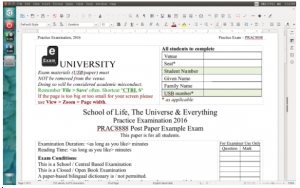Exams on Laptops: ANU Trials Digital Exam Project.
Students could be allowed to use their own laptops in exams, in an e-exams pilot project ANU is currently testing. But a trial last semester was cancelled due to software incompatibility and questions of unfairness.
Under the plan, students could bring their own laptops into the exam room, where they would receive a USB to run ‘e-exam software’. The software blocks all programs on the computer, allowing sole access to a word-processing program in which students can write answers to exam questions.
Laptop exams were to be trialed last semester in the Foundations of Australian Law course for the Juris Doctor. This trial was optional: students could decide whether to type the exam, or hand-write the paper in a separate room. Students in the course quickly raised equity concerns, as all students would be given equal time regardless of their choice to write or type.

An example of an on-laptop exam sheet.
Students were not guaranteed they could charge their laptops during the exam. If technical difficulties arose, students would be transported immediately to a different room, where they would continue their test on paper. These difficulties, along with incompatibility with less mainstream computers, resulted in the cancellation of the trial. There was no suggestion of back up or loan laptops to counteract these problems.
This project, called “Transforming exams across Australia”, is funded by a $500,000 government grant. ANU has partnered with eight other Australian universities, including Monash University, the University of Queensland, and the University of Tasmania.
ANU’s further participation is not set in stone. Observer understands that the prospect for a trial in Semester 2 is still undecided. The project website states that all nine universities “are currently piloting the platform with the aim of all adopting it, either partially or fully, by the end of [next year]”. It’s uncertain whether this will occur.
Exam laptop trials were conducted in 8 courses at the University of Queensland in 2014-2015. 20% of the students’ laptops had technical issues and could not be used, and only 15% chose to type. Most hand-writers said they chose based on “fear of technology failure” and familiarity with handwriting. Of the 531 test-takers, 19 had incompatibility issues, and around 20 did not own laptops. To deal with this, there was a pool of loaned laptops for use. When analysing results, the study discovered that typists did better overall (though they did not claim causation).
If this project falls through, there still exist possibilities for future ventures into digitising exams. ANU told Observer, “Our participation in the project is also a commitment to raising awareness of the need to improve Australia’s digital infrastructure, and to find solutions that are equitable and accessible.”









